
"Cinderella", or "The Little Glass Slipper", is a folk tale with thousands of variants that are told throughout the world. The protagonist is a young girl living in forsaken circumstances that are suddenly changed to remarkable fortune, with her ascension to the throne via marriage. The story of Rhodopis, recounted by the Greek geographer Strabo sometime between 7 BC and 23 AD, about a Greek slave girl who marries the king of Egypt, is usually considered to be the earliest known variant of the Cinderella story.
Cinderella Op. 87, is a ballet composed by Sergei Prokofiev to a scenario by Nikolai Volkov. It is one of his most popular and melodious compositions, and has inspired a great many choreographers since its inception. The piece was composed between 1940 and 1944. Part way through writing it Prokofiev broke off to write his opera War and Peace. The premiere of Cinderella was conducted by Yuri Fayer on 21 November, 1945, at the Bolshoi Theatre, with choreography by Rostislav Zakharov and Galina Ulanova in the title role. Cinderella is notable for its jubilant music, lush scenery, and for the comic double-roles of the stepmother and the two stepsisters, more mad than bad in this treatment.

Cinderella is a 1950 American animated musical fantasy film produced by Walt Disney Productions and released by RKO Radio Pictures. Based on Charles Perrault's 1697 fairy tale, it features supervision by Ben Sharpsteen. The film was directed by Wilfred Jackson, Hamilton Luske, and Clyde Geronimi. The film features the voices of Ilene Woods, Eleanor Audley, Verna Felton, Rhoda Williams, James MacDonald, and Luis van Rooten.

The Slipper and the Rose: The Story of Cinderella is a 1976 British musical retelling the classic fairy tale of Cinderella. The film was chosen as the Royal Command Performance motion picture selection for 1976.
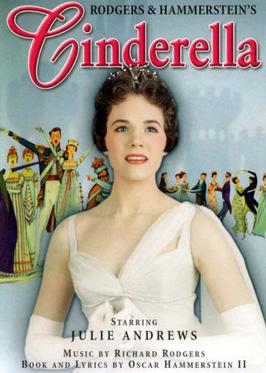
Rodgers and Hammerstein's Cinderella is a musical written for television, but later played on stage, with music by Richard Rodgers and a book and lyrics by Oscar Hammerstein II. It is based upon the fairy tale Cinderella, particularly the French version Cendrillon, ou la petite pantoufle de verre, by Charles Perrault. The story concerns a young woman forced into a life of servitude by her cruel stepmother and self-centered stepsisters, who dreams of a better life. With the help of her fairy godmother, Cinderella is transformed into a princess and finds her prince.

The Glass Slipper (1955) is an American musical film adaptation of the fairy tale Cinderella, made by MGM, directed by Charles Walters and produced by Edwin H. Knopf from a screenplay by Helen Deutsch. The music score is by Bronislau Kaper, the cinematography by Arthur E. Arling, the art direction by Daniel B. Cathcart and Cedric Gibbons and costume design by Walter Plunkett and Helen Rose.
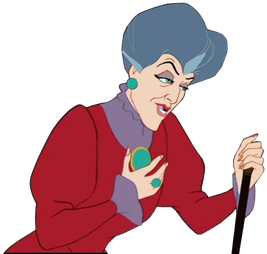
Lady Tremaine is a fictional character who appears in Walt Disney Productions' animated film Cinderella (1950) and its direct-to-video sequels Cinderella II: Dreams Come True (2002) and Cinderella III: A Twist in Time (2007). In the original film, Lady Tremaine is voiced by American actress Eleanor Audley, who would later voice Maleficent, the evil fairy, in Sleeping Beauty (1959) and Madame Leota in The Haunted Mansion. For the sequels and subsequent film and television appearances, Audley was succeeded by American actress Susanne Blakeslee who also currently voices Maleficent, Cruella de Vil from 101 Dalmatians, and the Evil Queen from Snow White and the Seven Dwarfs. She is given the title of Lady in the original film.

Confessions of an Ugly Stepsister is a 1999 fantasy novel by American writer Gregory Maguire, retelling the tale of Cinderella through the eyes of one of her "ugly stepsisters." In 2002, the book was adapted into a TV movie of the same name directed by Gavin Millar.
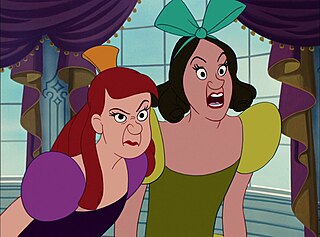
Anastasia and Drizella are characters in the fairy tale and pantomime, Cinderella. They are the daughters of Cinderella's wicked stepmother, who treat her poorly. Anastasia and Drizella have been in variations of the story from as early as researchers have been able to determine.
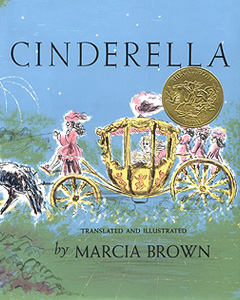
Cinderella, or the Little Glass Slipper is a book adapted and illustrated by Marcia Brown. Released by Charles Scribner's Sons, the book is a retelling of the story of Cinderella as written by Charles Perrault, and was the recipient of the Caldecott Medal for illustration in 1955. The book takes place in France, in a palace similar to other Cinderella stories.
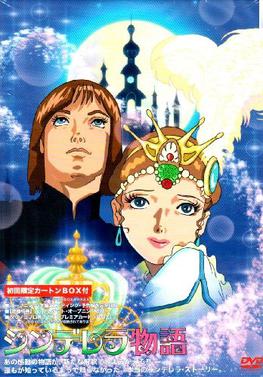
Cinderella is an Italian-Japanese 1996 anime television series based on the fairytale of the same name by Charles Perrault and The Brothers Grimm. It was produced by Tatsunoko Productions and Mondo TV. The series originally aired from April 4 to October 3, 1996, comprising 26 episodes.

Hey, Cinderella! is a 1969 television special adaptation of the fairy tale Cinderella, produced by Muppets, Inc. in the United States and Robert Lawrence Productions in Canada, and featuring The Muppets created by Jim Henson, who also directed the special. It was written by Jon Stone and Tom Whedon, and scored by the music composer of Sesame Street, Joe Raposo. It featured Kermit in his first appearance as a frog, as well as Goshposh and Rufus and Splurge.

Cinderella is a 1914 silent film starring Mary Pickford, directed by James Kirkwood Sr., produced by Daniel Frohman, and released by Famous Players Film Company. The film is based upon the fairy tale Cinderella. The film was released on Blu-ray & DVD as a bonus feature from the DVD of Through the Back Door (1921). It was previously released on DVD by Alpha Video.
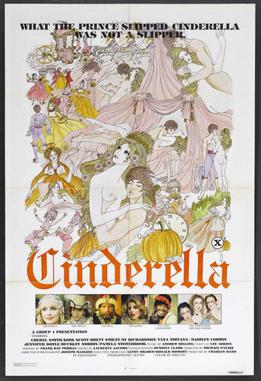
Cinderella is a 1977 American erotic musical comedy film directed by Michael Pataki and starring Cheryl "Rainbeaux" Smith, Brett Smiley, and Sy Richardson.
Cinderella is a 1979 animated Soviet film created by the studio Soyuzmultfilm. It is based on Charles Perrault's story, Cinderella.

Rodgers + Hammerstein's Cinderella is a musical in two acts with music by Richard Rodgers, lyrics by Oscar Hammerstein II, and a book by Douglas Carter Beane based partly on Hammerstein's 1957 book. The story is derived from the fairy tale Cinderella, particularly the French version Cendrillon ou la petite pantoufle de verre, by Charles Perrault. The story concerns a young woman forced into a life of servitude by her cruel stepmother. She dreams of a better life, and with the help of her Fairy Godmother, Cinderella is transformed into an elegant young lady and is able to attend the ball to meet her Prince. In this version, however, she opens the Prince's eyes to the injustice in his kingdom.
Cinderella is a Disney franchise that commenced in 1950 with the theatrical release of the 1950 film Cinderella. The series' protagonist is Cinderella, who was based on the character of the same name from the Cinderella fairy tale.

Once Upon a One More Time is a jukebox musical based on songs popularized by Britney Spears. Set in a fantasy storybook realm, the plot follows numerous fairy-tale characters transformed by a feminist awakening.

Andrew Lloyd Webber's Cinderella, produced on Broadway as Bad Cinderella, is a musical with music by Andrew Lloyd Webber, lyrics by David Zippel, and a book by Emerald Fennell. Loosely adapted from the classic story of the same name, plot changes include recast gender relationships and thematic exploration of beauty shaming. Cinderella changes her appearance to secure love, but discovers it is better to be true to oneself.















